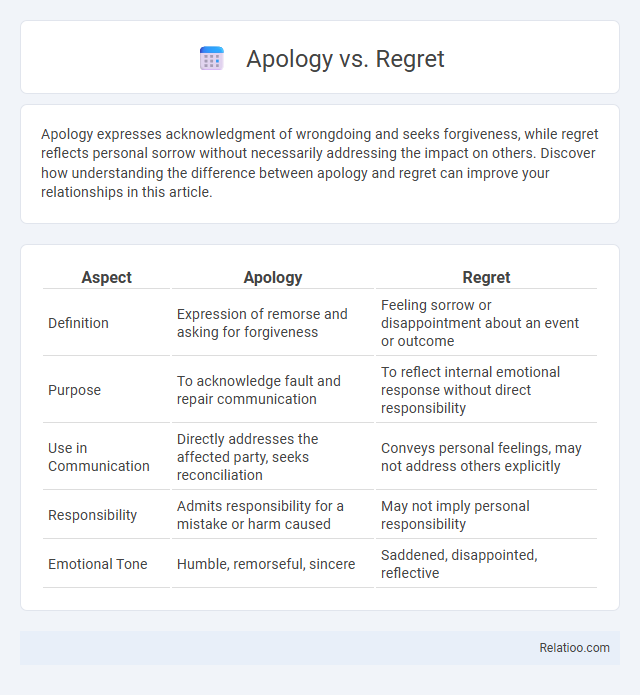Apology expresses acknowledgment of wrongdoing and seeks forgiveness, while regret reflects personal sorrow without necessarily addressing the impact on others. Discover how understanding the difference between apology and regret can improve your relationships in this article.
Table of Comparison
| Aspect | Apology | Regret |
|---|---|---|
| Definition | Expression of remorse and asking for forgiveness | Feeling sorrow or disappointment about an event or outcome |
| Purpose | To acknowledge fault and repair communication | To reflect internal emotional response without direct responsibility |
| Use in Communication | Directly addresses the affected party, seeks reconciliation | Conveys personal feelings, may not address others explicitly |
| Responsibility | Admits responsibility for a mistake or harm caused | May not imply personal responsibility |
| Emotional Tone | Humble, remorseful, sincere | Saddened, disappointed, reflective |
Understanding Apology and Regret
Understanding apology involves recognizing an expression of remorse or asking for forgiveness for a specific action, showing accountability and a desire to mend relationships. Regret, on the other hand, reflects a deeper emotional response to the consequences of an action, often involving personal reflection and sorrow for the outcome. Your ability to differentiate apology from regret enhances communication by addressing both the need to acknowledge fault and the emotional impact on those involved.
Key Differences Between Apology and Regret
Apology involves explicitly expressing remorse and taking responsibility for a specific action that caused harm, while regret is a feeling of sorrow or disappointment about an outcome without necessarily admitting fault. An apology often requires you to communicate your acknowledgment of wrongdoing and seek forgiveness, whereas regret may remain internal and unexpressed. Understanding these key differences helps your interactions remain clear and sincere, especially in personal and professional relationships.
The Psychology Behind Apology
Understanding the psychology behind apology involves recognizing how expressing regret differs from a straightforward apology, where regret conveys personal sorrow and an apology acknowledges responsibility for harm caused. Your ability to effectively apologize can restore trust and improve relationships by validating the feelings of the aggrieved party while communicating genuine remorse. Psychologically, this nuanced communication fosters emotional healing and reduces conflict by demonstrating empathy and accountability.
The Emotional Impact of Regret
Regret often carries a deeper emotional impact than a simple apology, as it involves a personal recognition of loss or missed opportunity that can provoke feelings of sorrow and reflection. Unlike an apology, which is primarily an expression of remorse or acknowledgement of a mistake, regret encompasses a more profound emotional struggle with the consequences of one's actions or inactions. The emotional weight of regret can lead to long-lasting introspection and a stronger motivation for behavioral change.
When Apology is Needed
An apology is necessary when you have caused harm, offense, or inconvenience to someone, demonstrating acknowledgment and responsibility for your actions. Regret reflects internal feelings of sorrow but does not require expression unless paired with an apology to address the affected party. Your ability to offer a sincere apology fosters reconciliation and trust, making it vital in resolving conflicts and maintaining healthy relationships.
Situations That Lead to Regret
Situations that lead to regret often involve missed opportunities, wrong decisions, or unintentional harm caused to others, triggering a deep sense of sorrow or disappointment. Unlike an apology, which is an explicit expression of remorse aimed at reconciliation, regret is an internal emotional response reflecting personal acknowledgement of a negative outcome. Understanding the distinction between regret and apology helps in effectively addressing emotional consequences and fostering genuine communication.
The Role of Responsibility in Apology
The role of responsibility in apology is crucial, as a genuine apology explicitly acknowledges personal accountability for specific actions causing harm. Regret expresses sorrow or disappointment without necessarily admitting fault, thereby lacking the essential element of taking responsibility. Effective apologies foster trust and reconciliation by combining acknowledgment of wrongdoing with sincere remorse and a commitment to make amends.
How Regret Can Influence Behavior
Regret often drives individuals to reflect deeply on past decisions, influencing future actions by creating a strong desire to avoid repeating mistakes. Unlike an apology, which merely acknowledges wrongdoing, regret compels behavioral change rooted in emotional awareness. Your ability to recognize and act on regret can lead to personal growth and improved decision-making.
Apology and Regret in Relationships
Apology and regret play distinct roles in relationships, where an apology is a verbal expression acknowledging a mistake and seeking forgiveness, while regret involves a personal feeling of sorrow or remorse for one's actions. You demonstrate emotional maturity and foster trust when you offer a sincere apology that directly addresses the hurt caused. Regret, although internal, can motivate positive change, but without a verbal apology, it may not heal the emotional impact or restore the relationship effectively.
Moving Forward: From Regret to Genuine Apology
Moving forward from regret to a genuine apology involves acknowledging the specific harm caused and taking responsibility for one's actions without deflection. A genuine apology includes expressing sincere remorse, making amends, and demonstrating changed behavior to rebuild trust. Unlike mere regret, which is often passive and self-focused, a true apology actively prioritizes the feelings and healing of the affected person.

Infographic: Apology vs Regret
 relatioo.com
relatioo.com